
International Research Journal of Engineering and Technology (IRJET) e-ISSN: 2395-0056
Volume: 11 Issue: 07 | July 2024 www.irjet.net p-ISSN: 2395-0072


International Research Journal of Engineering and Technology (IRJET) e-ISSN: 2395-0056
Volume: 11 Issue: 07 | July 2024 www.irjet.net p-ISSN: 2395-0072
1Surya M D Gowda, 2Ankith B Shetty, 3Mohith Aradhya, 4Nehal C Gadkar
1 Department of Computer Science and Engineering, NIE, Mysore
2 Department of Computer Science and Engineering, NIE, Mysore
3 Department of Computer Science and Engineering, NIE, Mysore
4 Department of Computer Science and Engineering, NIE, Mysore
Mrs. Poornima N, Assistant Professor, Dept. of Computer Science and Engineering, NIE, Karnataka, India
Abstract This research introduces a transformative solution to address the pervasive challenges in the contemporary ticketing industry, including ticket fraud, scalping, and transparency deficits. The project aims to revolutionize ticketing through the development of a Decentralized Online Ticket System. The proposed system leveragescutting-edgetechnologies,specificallynon-fungible tokens (NFTs) and smart contracts, to establish a secure and tamper-proofenvironment.Bytransformingeventticketsinto NFTs, the system enhances security and authenticity. Smart contracts automate key ticket-related processes, such as transfers and sales, ensuring efficiency and transparency. Furthermore, the project facilitates a secondary market for tickettrading,fosteringafairandtransparentecosystem.This research contributes to the evolving field of decentralized systems, offering a pioneering approach to mitigate the challenges inherent in the ticketing industry.
Keywords: Decentralized Online Ticket System, Ticket Fraud, Scalping, Transparency, Non-Fungible Tokens (NFTs), Smart Contracts, Tamper-Proof, Security, Authenticity, Ticket Ownership, Secondary Market, Fair Ecosystem,ContemporaryTicketingIndustry,Innovative Solutions,BlockchainTechnology.
Intoday'sdigitalage,theparadigmofbookingticketsfor events,concertsandentertainmentshowshasundergonea radicalchangewiththeemergenceofonlineplatforms.This platformoffersuserstheconvenienceofbrowsing,selecting and purchasing tickets from the comfort of their homes, experiencing an era of unprecedented access. However, despiteitsconvenience,thecentralizednatureoftraditional onlineticketingsystemshasledtopersistentchallengesthat undermineuserexperienceandprocessintegrity.
Issues such as ticket fraud and scalping complicate the online ticketing space and pose a major threat to event organizers and attendees. In addition, the lack of transparencyregardingfeesandchargesoftenleavesusersin financiallimbo,losingtrustandconfidenceinthesystem.To respondtothesechallenges,thereisa needforinnovative solutionsthatcantransformtheonlineticketingecosystem, ensuring security, transparency and fairness for all stakeholders.
Thisresearchpaperproposesaradicalapproachtoonline ticketingusingthepowerofblockchaintechnologyandnonvolatiletokens(NFT).ByincorporatingblockchainandNFTs into the ticketing process, we aim to overcome the shortcomingsoftraditionalsystemswhileopeningupnew opportunitiestoimprovesecurityandefficiency.
Thebasicconceptoftheproposedsystemistoconvert traditionalticketsstoredsecurelyonacentralizedblockchain intounique,verifiableNFTs.Unliketraditionaltickets,which arepronetofraudandmanipulation,NFTsoffertheunique featuresofimmutabilityanduniqueness,makingthemideal forrepresentingdigitalassetssuchaseventtickets.
Smart contracts, code that can be executed on a blockchain, play an important role in automating various ticket-relatedprocesses,includingissuing,transferringand reselling. By using smart contracts, we can ensure transparentandsecuretickettransactions,eliminatetherisk of counterfeit tickets and promote fairness and accountability.
Additionally,theintroductionofasecondarymarketfor NFT-basedtickettradingopensupnewwaysforuserstobuy, sell and exchange tickets in a decentralized manner. This secondary market not only increases liquidity, but also promotes a fairer and more inclusive ecosystem where genuinefanshaveampleopportunitytopurchaseticketsat affordableprices.
Inconclusion,theproposedhive-basedapproachtoonline ticketshasthepotentialtochangethewaytheyarebought, sold and managed in the digital age. By addressing the inherent challenges oftraditional systemsand introducing innovativefeaturesenabledbyblockchainandNFTs,wecan createamoresecure,transparentanduser-centricticketing ecosystemthatbenefitsbotheventorganizersandattendees.
In[1],LiJiandTingtingZhoufromShanghaiFilmAcademy andShanghaiUniversityproposedaticketsystembasedon Non-FungibleToken(NFT)tosolvetheproblemoffraudand shrinkage in traditional tickets. They have innovatively introduced NFTs to connect tickets and buyers through blockchaintechnology,increasingauthenticity,controland

International Research Journal of Engineering and Technology (IRJET) e-ISSN: 2395-0056
Volume: 11 Issue: 07 | July 2024 www.irjet.net p-ISSN: 2395-0072
transparencyinticketingtransactions.Theirsystemnotonly usesblockchainforticketmanagement,butalsomanagesthe secondary market, ensuring fair prices and consumer protection.
In[2],PatcharapornSombatandParujRatanaworachan from Kasetsart University developed a honeycomb-based ticketing platform using Ethereum Virtual Machine (EVM) based smart contracts on the Ethereum blockchain and Avalanche. The platform uses the ERC-721 standard to increasetransparencyanddecentralization.Whentheyoffer open source code on GitHub, they show the efficiency and effectivenessoftheplatform,especiallyinPowerBlockchain.
In[3],DavidCarmeloCalderoneexploresthepotentialof Non-FungibleTokens(NFT)usingblockchaintechnologyfor uniquedigitalassetsinmanagingsportsevents.Througha comparativeanalysis,the paper explores the challengesof NFTadoption,theemergenceofblockchainsolutions,andthe useofNFTticketswithPOAPsandsmartcontractsforfan engagement.Despiteitsshortcomings,NFToffersaunique opportunity to improve the fan experience and revenue streaminthemanagementofsportingevents.
In[4],TralynLe,YoohwanKim,andJu-ononJoproposeda blockchain-basedeventtradingsystemusingEthereumand smart contracts to ensure ownership and prevent fraud. Sellers verify their identity through MetaMask, pay a registration fee, and use mutual guarantees to reduce fraudulentactivityandcreateasaferecyclingenvironment.
In [5], Nguyen, Huu-Quang, Huynh Tuong Nguyen, and Thi-ThietPhamproposedahoneycomb-basedticketingand trackingsystemtosolvetheproblemofcounterfeitticketsin HoChiMinhCityUniversityofTechnology.Theirworkbuilds onpreviousresearchsuchasDoan'sdigitalcurrencysystem fore-booktransactions,blockingsolutionsforemailsecurity, andresearchonnon-traceabletokens(NFT)ineventtickets byFerdinandetal.
In [6], Lin, Keng-Pei, Yi-Wei Chang, and Zhi-Hong Wei presentamulti-signatureblockchain-basedmobileticketing systemforimplementingandvalidatingsmartcontractsand transactions. His work uses blockchain technology for efficient and secure ticket transactions based on previous researchsuchasTYMDoan'sdigitalcurrencysystemandthe useofblockchaininemailsecuritybyLeetal.
In[7],RafatiNiyaetal.IntroducingDeTi,adecentralized ticket management platform using blockchain and smart contracts to address issues related to ticket counterfeiting andtheblackmarket.Theirworkbuildsonpreviousresearch ondecentralizedticketingsolutions,suchasthosethatuse blockchain-basedservice management functions toensure ticketauthenticityandmanagesubsequenttransactions.
In[8]Konstantinidisetal.Presentsasystematicliterature review that examines the various business sectors where
blockchaintechnologyfindsapplication.Theirworkexplores current implementations and future applications, while addressingchallengesandbarrierstoblockchainexpansion. Byanalyzingvariouspreliminarystudies,itprovidesinsight intothedisruptiveimpactandproblemsassociatedwiththe adoptionofblockchaintechnologyinvariousindustries.
In[9],Toyodaetal.proposesablockchain-basedProduct OwnershipManagementSystem(POMS)tocombatfraudin thesupplychain.Usingimmutableblockingrecords,POMS verifies product ownership, allowing customers to reject counterfeitsevenwithauthenticRFIDtaginformation.The system implementation of the concept on Ethereum demonstratescost-effectiveownershipmanagementforsix transfers.
In[10],Ompaletal.Proposeanewblockchain-basedNonFungibleToken(NFT)ticketingsystemtosolveticketfraud andenvironmentalsanitationissuesontraditionalpaperand QRcodetickets.ByusingNFTs,thesystemcreatesachainof ownershipthatcanbetracedandverified,increasingcontrol over ticket sales and secondary market transactions. This studyfillsanimportantknowledgegapbydemonstratingthe impactofNFTsonticketsthroughrigorousevaluationand designsciencemethodology.
The current state of online sales systems faces serious challengesthathindertheireffectivenessandreliability.The traditionalticketingsystem,characterizedbyahierarchical systeminwhichticketdistributionandcontroliscentralized, hasmanyproblems.Themostimportantofthesedifficulties is the problem of ticket fraud. In an integrated system, maliciousactorsexploitvulnerabilitiestocreatefaketickets, leadingtofinanciallossandfrustrationforeventorganizers andticketbuyers.Thistypeoffraudnotonlyunderminesthe ticketing process, but also undermines the trust of event visitors.Inadditiontoticketfraud,ticketingincidentsalso increase the fragility of ticketing systems. Scalpers take advantage of market demand by buying large numbers of ticketsandsellingthemathighprices,disruptingthesupplydemandbalance.Thispracticenotonlydisrespectstruefans, but also creates injustice and inequality in the ticketing environment. Additionally, the lack of transparency and accountability in ticket sales models exacerbates existing problems.Opaqueratesanduncertaintiesoftenoverwhelm ticket buyers, leading to dissatisfaction and distrust. Additionally, ticket buyers' limited control over the possessionandtransferofticketsperpetuatesvulnerability and a sense of disenfranchisement among users. To solve these many problems, it is necessary to change the way decentralized ticketing is done. By leveraging emerging technologiessuchasblockchainandabstracttokens(NFTs), decentralizedticketingsystemsprovideaneffectivesolution tothemostfundamentalproblemsfacingtheenvironment. However, implementing and validating a decentralized

Volume: 11 Issue: 07 | July 2024 www.irjet.net p-ISSN: 2395-0072
ticketing system requires extensive research, analysis and evaluationforittobeeffective,efficientandeffectiveinthe ticketingindustry.
The traditional approach to online ticketing revolves around centralized systems, wherein the distribution and managementofticketsareprimarilycontrolledbyaselect group of entities. This centralized model encompasses various stakeholders, including event organizers, ticketing platforms,andsometimesthird-partyresellers.
Intheexistingsystem,ticketsaretypicallyissuedineither digitalorphysicalformats.Uponpurchase,ticketsareeither deliveredelectronicallyviaemailormobileappsorphysically dispatched to the buyer's address. During the event, attendees present their tickets for validation, either in printedformordigitallyviasmartphonesorotherelectronic devices. However, despite its widespread adoption, the existing centralized ticketing system is plagued by several challenges:
1) TicketFraud:Fraudulentactivitiesareprevalentwithin the centralized ticketing ecosystem, with counterfeit ticketsbeingcirculatedinthemarket.Fraudstersexploit vulnerabilities in ticketing platforms to produce fake tickets, resulting in financial losses for both event organizersandunsuspectingticketbuyers.
2) Scalping:Ticketscalping,wherebyticketsarepurchased inbulkandresoldatinflatedprices,isapervasiveissue intheexistingsystem.Scalpersleveragemarketdemand tocapitalizeonticketshortages,oftenleavinggenuine fansunabletoattendeventsduetoexorbitantpricesset byresellers.
3) LackofTransparency:Thecentralizedticketingmodel often lacks transparency, with hidden fees and undisclosed charges catching ticket buyers off guard. Attendees may find themselves unaware of the actual costsinvolved,leadingtodissatisfactionandmistrustin theticketingprocess.
4) Limited Ownership Control: Once a ticket is sold, the original purchaser typically loses control over its subsequenttransfersorresale.Thislackofownership controlleavesticketssusceptibletounauthorizedresale ortransfer,furthercomplicatingtheticketinglandscape.
Theproposeddecentralizedticketingsystempresentsa novel approach to online ticketing, integrating blockchain technologyandnon-fungibletokens(NFTs)toovercomethe limitationsofthecentralizedticketingmodel.Thisinnovative systemaimstoprovideasecure,transparent,andequitable ticketingexperienceforbotheventorganizersandattendees.
Key components of the proposed decentralized ticketing systeminclude:
1) Utilization of Blockchain and NFTs: Event tickets are converted into unique NFTs and securely stored on a blockchain platform. Each ticket is assigned a distinct token ID, ensuring its authenticity and immutability. Throughblockchaintechnology,thesystemmaintainsa transparent and tamper-proof record of ticket ownershipandtransactionhistory.
2) Integration of Smart Contracts: Smart contracts are employedtoautomatevariousticket-relatedprocesses such as issuance, transfer, and resale. These selfexecuting contracts enforce predefined rules and conditions,eliminatingtheneedforintermediariesand ensuring transparency and fairness in ticket transactions. Smart contracts facilitate secure and efficient ticket transfers while minimizing the risk of fraudandunauthorizedresale.
3) IntroductionofaDecentralizedSecondaryMarket:The proposedsystemintroducesadecentralizedsecondary marketfortickettrading,enablinguserstobuyandsell tickets directly on the blockchain platform. By eliminating intermediaries, the secondary market promotes transparency and fairness in ticket pricing. Pricesaredeterminedbymarketdynamics,preventing scalping practices and ensuring equitable access to tickets.
4) Enhanced Security Measures: Leveraging blockchain technology and NFTs enhances the security of the ticketing system, reducing the risk of ticket fraud and counterfeiting.Eachticketisuniquelyassociatedwithits owner's blockchain address, making it virtually impossibletoduplicateortamperwith.Thetransparent nature of the blockchain allows users to verify the authenticityofticketsandtracktheirownershiphistory.
5) Transparency and Ownership Control: The decentralized nature of the proposed system grants users greater transparency and control over their tickets. Ticket holders have full ownership control, allowing them to transfer and resell tickets with confidence.Thetransparentandauditablenatureofthe blockchainensuresvisibilityintotickettransactionsand ownership changes, fostering trust and accountability withintheticketingecosystem.
Thedesignoftheproposeddecentralizedticketingsystemis meticulouslycraftedtoensureaseamlessuserexperience while leveraging the security and efficiency of blockchain technology. International Research Journal of Engineering and Technology (IRJET) e-ISSN: 2395-0056

Volume: 11 Issue: 07 | July 2024 www.irjet.net p-ISSN: 2395-0072
A. Architecture Design
1) Blockchain Integration: The system is built upon a blockchain platform, like Ethereum, serving as the foundation for storing and managing ticket data securely. Smart contracts are deployed on the blockchain to automate ticket-related processes and enforcepredefinedrules.
2) Smart Contracts: These contracts execute predefined logicautonomously,governingticketissuance,transfer, andresale.Theyinteractwiththeblockchaintofacilitate transparentandfairtickettransactions.
3) DecentralizedStorage:Ticketdata,includingNFTsand transaction records, are securely stored in a decentralizedmannerontheblockchain.Thisensures dataintegrityandpreventstampering.
B. User Interface Design
1) RegistrationandAuthentication:Userscanregisterand loginsecurelyusingtheirblockchainwalletaddresses orotherauthenticationmethodslikeMetaMask.
2) Ticket Purchase: The purchasing process is userfriendly,allowinguserstobrowseevents,selecttickets, andcompletetransactionsseamlessly.
3) Ticket Management: Users can manage their tickets, includingviewingdetails,transferringownership,and listing tickets for resale. Ownership history and transactionactivityareeasilyaccessible.
4) SecondaryMarket:Adedicatedsectionallowsusersto buyandsellticketsdirectlyontheplatform.Real-time pricingandtransactiondataareprovidedforinformed decision-making.
5) TransactionHistory:Userscanaccesstheirtransaction history,providingtransparencyandaccountability.
C. Security Measures
1) Encryption and Authentication: Sensitive data is encrypted,androbustauthenticationmechanismsare implementedtoprotectuserinformation.
2) AccessControl:Role-basedaccesscontrolensuresthat onlyauthorizeduserscanaccessspecificfeaturesand data.
3) ImmutableLedger:Theblockchainactsasanimmutable ledger,recordingalltickettransactionstransparently.
D. Scalability and Performance
1) Optimized Smart Contracts: Smart contracts are optimized for efficiency and scalability to minimize transactioncosts.
2) Load Balancing: Mechanisms for load balancing and resource optimization are implemented to maintain optimalperformance.
Insummary,thedesignoftheproposeddecentralized ticketingsystemprioritizesuserexperience,security,and scalabilitywhileharnessingthepowerofblockchain technologytorevolutionizetheticketingindustry.
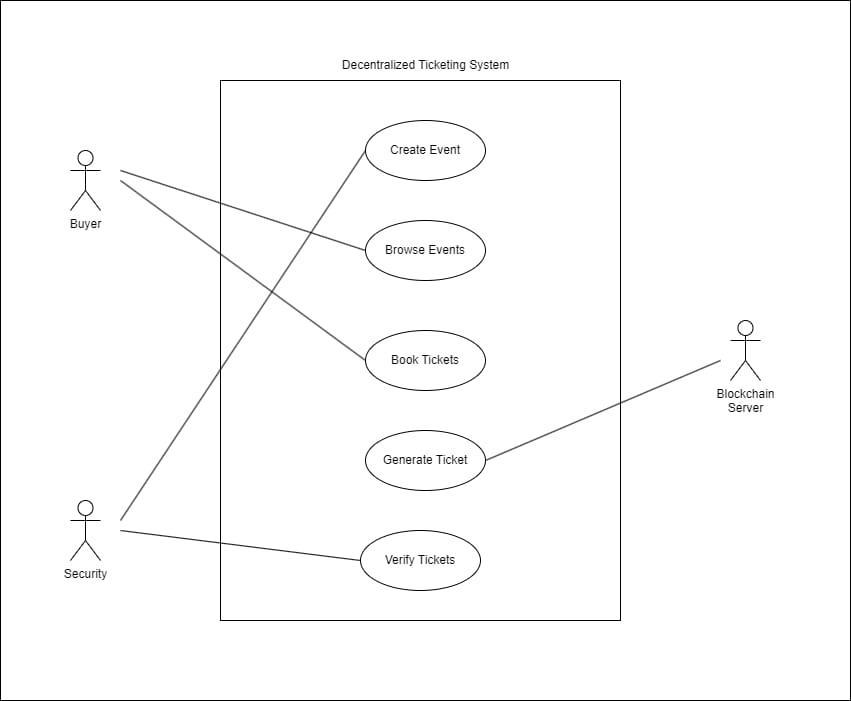
Fig.1.UseCaseDiagram
Thedecentralizedticketingsystemisimplementedthrough theuseofNFTs(Non-FungibleTokens).TheNFTsrepresent eachindividualticketsissuedbystoringalltheinformation presentinthemdigitally.TheseNFTsareanextensionofa smartcontractwhichmeanstheyeachofthesetokenscarry a code that allows to automatically perform necessary conditional checks and run specified code for different actionsperformedwiththesetokens.

Volume: 11 Issue: 07 | July 2024
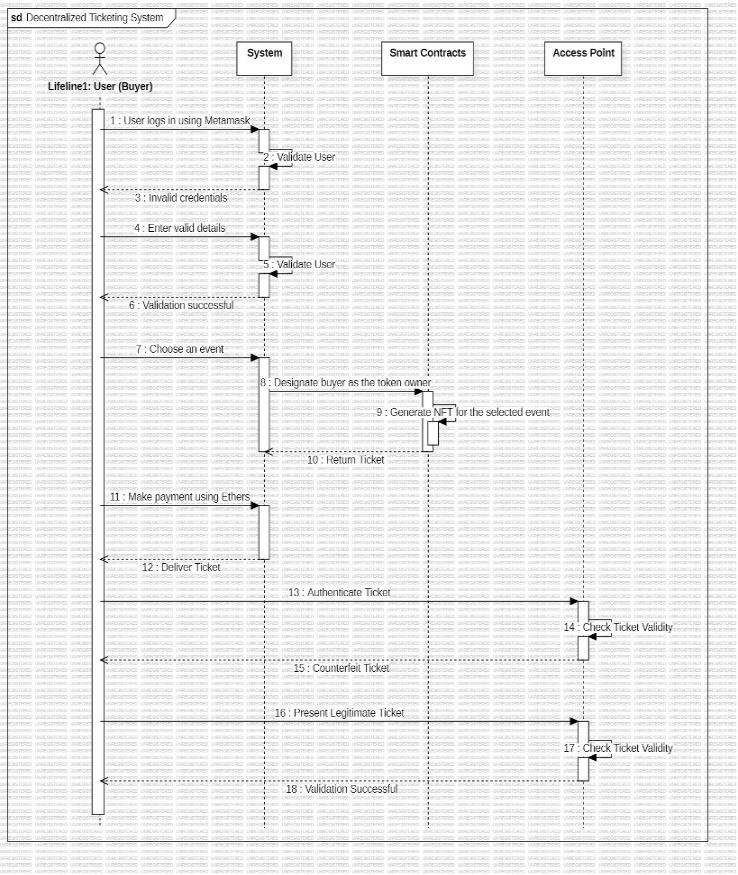
Fig.2.SequenceDiagram
So, when action of transferring a token from one user to anotherorbuyingatokenfromanotheruserisperformed the code associated with those actions is executed which performs a conditional check whether the current time exceedsthetokendeadlinewhichisthetimeafterwhichthe usercannottransfertheirticket/token.
8. RESULTS
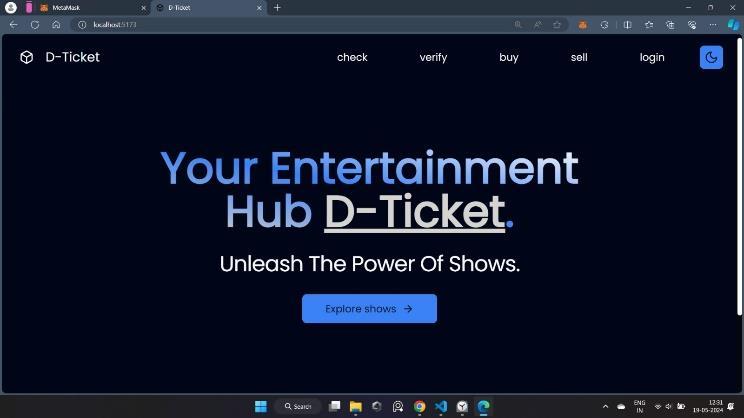
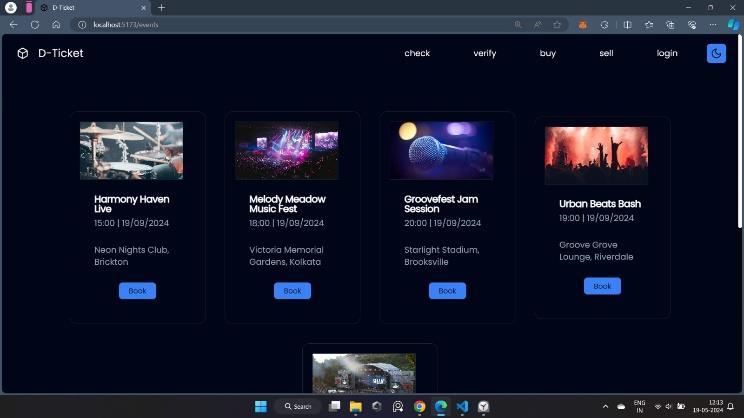

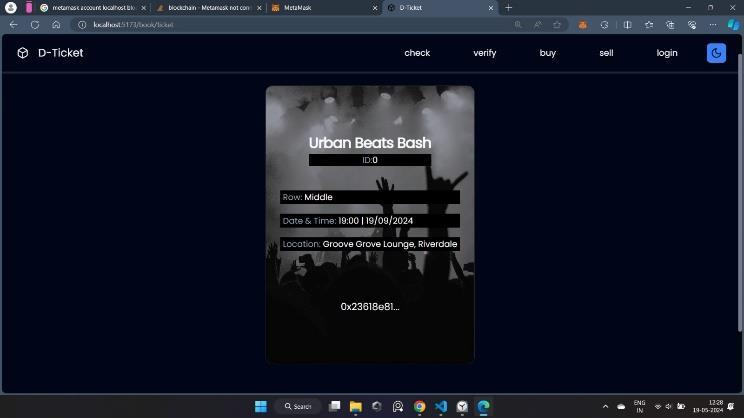
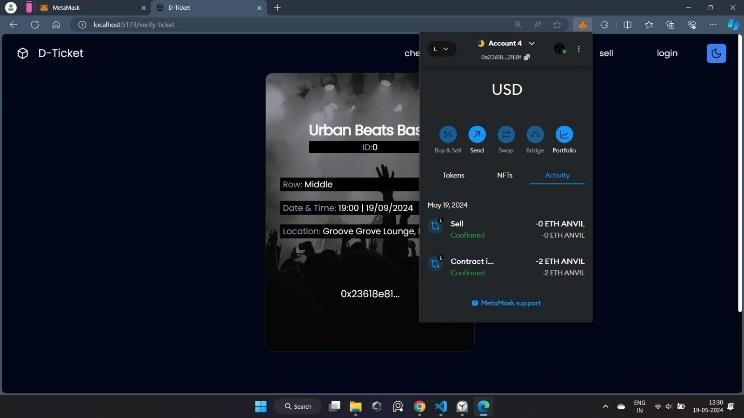

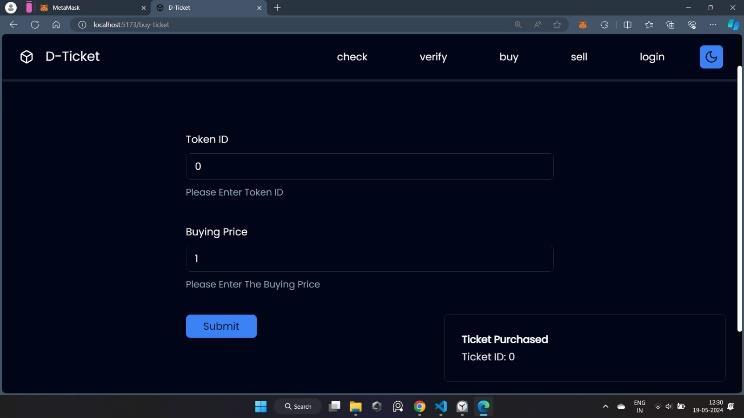
BuyPage
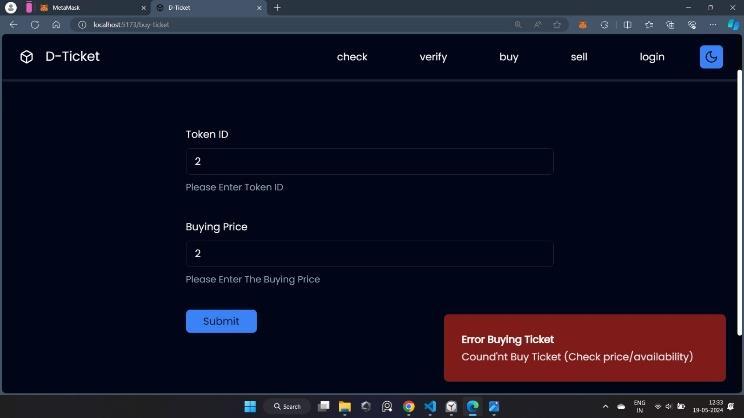
Fig.9. BuyPagewitherrordisplayed
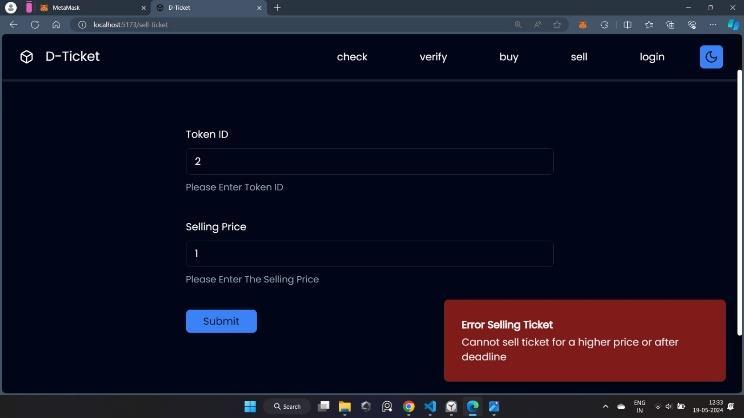
Fig.10. SellPagewitherrordisplayed
Our project presents an innovative approach to combat ticket scalping at concerts and sporting events by utilizingNon-FungibleTokens(NFTs)forticketgeneration and distribution. Through the implementation of smart contracts,eachticketisendowedwithspecificlogic,enabling ustoenforcerestrictionssuchassettingresalepricelimits and imposing time constraints on transfers or purchases. While our project still allows for peer-to-peer resale, the prevalenceofonlinedistributionsignificantlydiminishesthe impactofscalpingcomparedtotraditionalofflinemethods. Hence, our solution offers a viable means to mitigate the rampant illegal resale of tickets within the concert and
sporting industry, thereby fostering a fairer and more equitableticketingecosystem.
FutureEnhancementsinclude:
Allowuserstoviewtheirticketimagethroughtheir blockchainwalletinsteadofhavingtousewebsite everytime.
Createasecondaryticketmarketplacesouserscan viewallticketsupforsale.
Add QR code feature so that their address can be retrieved from scanning it, instead of manually enteringtheiraddressintoatextbox.
[1] Y.YuanJiangandJ.T.Zhou,"TicketingSystemBasedOn NFT," 2022 IEEE 24th International Workshop on MultimediaSignalProcessing(MMSP),Shanghai,China, 2022, pp. 01-05, doi: 10.1109/MMSP55362.2022.9948706. keywords: {Industries;Fans;Smart contracts;QR codes;Signal processing;Motion pictures;Multiple signal classification;blockchain;NFT;tickets;secondarymarket},
[2] P.SombatandP.Ratanaworachan,"ABlockchain-Based Ticket Sales Platform," 2023 27th International ComputerScienceandEngineeringConference(ICSEC), Samui Island, Thailand, 2023, pp. 226-230, doi: 10.1109/ICSEC59635.2023.10329682. keywords: {Computer science;Fans;Codes;Smart contracts;Standards organizations;Organizations;Censorship;Ticket sales platforms;Non-fungible tokens (NFTs);Avalanche blockchain;Ethereumblockchain},
[3] D.C.Calderone,"EventManagementEvolutionThrough Non-Fungible Tokens," 2023 IEEE International WorkshoponSport,TechnologyandResearch(STAR), Cavalese - Trento, Italy, 2023, pp. 85-89, doi: 10.1109/STAR58331.2023.10302446. keywords: {Industries;Fans;Technologicalinnovation;Finance;User experience;Cryptocurrency;Nonfungible tokens;Sport;Event Management;Fan Engagement;Blockchain;Non-fungible Tokens;Ticketing},
[4] T. Le, Y. Kim and J. -Y. Jo, "Implementation of a Blockchain-Based Event Reselling System," 2019 6th International Conference on Computational Science/Intelligence and Applied Informatics (CSII), Honolulu, HI, USA, 2019, pp. 50-55, doi: 10.1109/CSII.2019.00016. keywords: {Contracts;Systems architecture;Uniform resource locators;Memory management;Testing;Blockchain;Ethereum;Smart Contract}, International Research Journal of Engineering and Technology (IRJET) e-ISSN: 2395-0056 Volume: 11 Issue: 07 | July 2024 www.irjet.net

International Research Journal of Engineering and Technology (IRJET) e-ISSN: 2395-0056
Volume: 11 Issue: 07 | July 2024 www.irjet.net p-ISSN: 2395-0072
[5] H.-Q.Nguyen,H.T.NguyenandT.-T.Pham,"Applying SmartContractinBlockchainTechnologytoManagethe Ticketing Issuance and Ticketing Traceability," 2023 IEEEJordanInternationalJointConferenceonElectrical Engineering and Information Technology (JEEIT), Amman, Jordan, 2023, pp. 160-164, doi: 10.1109/JEEIT58638.2023.10185771. keywords: {Electrical engineering;Databases;System performance;Operating systems;Urban areas;Smart contracts;Blockchains;Solidity;Smart contract;Blockchain},
[6] K.-P.Lin,Y.-W.Chang,Z.-H.Wei,C.-Y.ShenandM.-Y. Chang, "A Smart Contract-Based Mobile Ticketing SystemwithMulti-SignatureandBlockchain,"2019IEEE 8thGlobalConferenceonConsumerElectronics(GCCE), Osaka, Japan, 2019, pp. 231-232, doi: 10.1109/GCCE46687.2019.9015425. keywords: {Contracts;Random access memory;Logic gates;Smart phones;Bitcoin},
[7] https://link.springer.com/content/pdf/10.1007/s1092 2-022-09675-3.pdf
[8] https://www.researchgate.net/profile/ChristosTimplalexis/publication/325787732_Blockchain_for_Bu siness_Applications_A_Systematic_Literature_Review/lin ks/5c6d4672a6fdcc404ebf40ca/Blockchain-forBusiness-Applications-A-Systematic-LiteratureReview.pdf
[9] https://ieeexplore.ieee.org/stamp/stamp.jsp?tp=&arnu mber=7961146
[10] https://ijrpr.com/uploads/V4ISSUE4/IJRPR12057.pdf